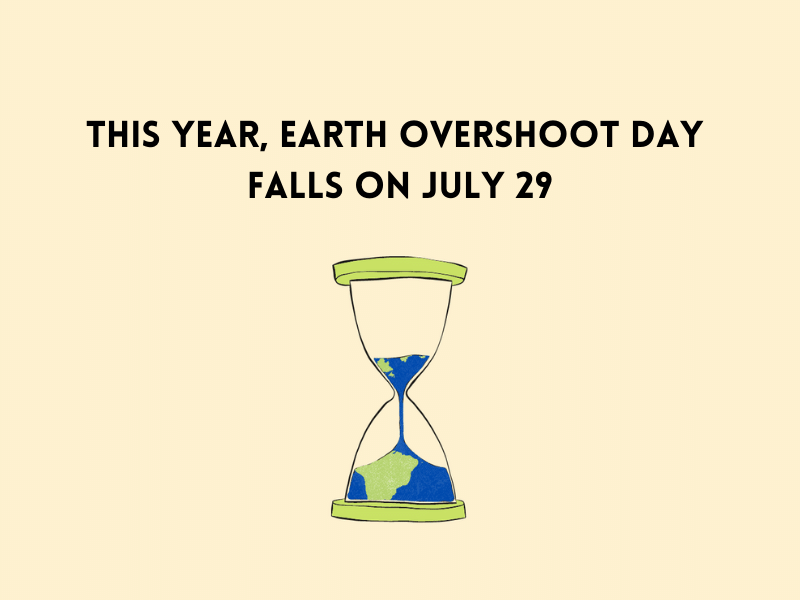
Written by João for Shop Like You Give a Damn, Image designed by Polly Drábová
So, today is Earth Overshoot Day of 2021. You might be asking yourself, what does that even mean? It means that as of today, we (the whole of humankind) have used more natural resources than Mama Earth can regenerate this same year. Shocking, right? And it definitely doesn’t end there. Let me explain.
Earth Overshoot Day also represents the date from which we exceed the earth’s natural biocapacity in terms of carbon absorption. Translating: we have emitted waaaay too much carbon dioxide into the atmosphere. Way more than what our ecosystems can actually absorb! To put it simply, the Earth is ringing the emergency bell, and we better be listening.
What is Earth Overshoot Day?
Earth Overshoot Day marks the date when humanity’s demand for ecological resources and services in a given year exceeds what Earth can regenerate in that same year.
Every year we extract almost 90 billion tons of biomass, fossil energy, metal and minerals from Earth – more than 11 tons for every single human on the planet. Think cropland, mining and forests for timber, which can cause huge biodiversity loss and soil degradation.
It also represents the date at which Earth has reached its limit when it comes to carbon absorption – which is the process of taking carbon dioxide out of the environment, for example by plants, ocean or soil.

Economically speaking, Earth Overshoot Day is the date by which the earth’s entire annual regenerative budget is spent, and we unavoidably enter environmental deficit spending. That means that: our consumption is way over the top, and the Earth’s supply is limited.
It’s kind of like we have now spent our entire year’s worth of salary, and from the Overshoot day until December 31st – we are living off credit cards and loans.
But everything comes in due time, including our (environmental) debts.
Why Should We Delay the Annual Earth Overshoot Day As Much As We Can?
Because the planet would have more time to regenerate its finite supply of resources and absorb the carbon we have emitted. If we are able to delay the Overshoot, it allows for us to develop a harmonious relationship with the earth we live on.
Essentially, the higher the carbon footprint and resource consumption, the more greenhouse gases increase and spur further climate change. And as we all know, global warming brings with it loads of environmental dangers.
Be it the floodings in Germany, Belgium and the Netherlands, or the heatwaves in Western North America. Even the bushfires in Australia that ravaged the fauna in 2019/2020. These are extreme examples of climate change, but also very clear reminders that these events could happen anytime, anywhere.
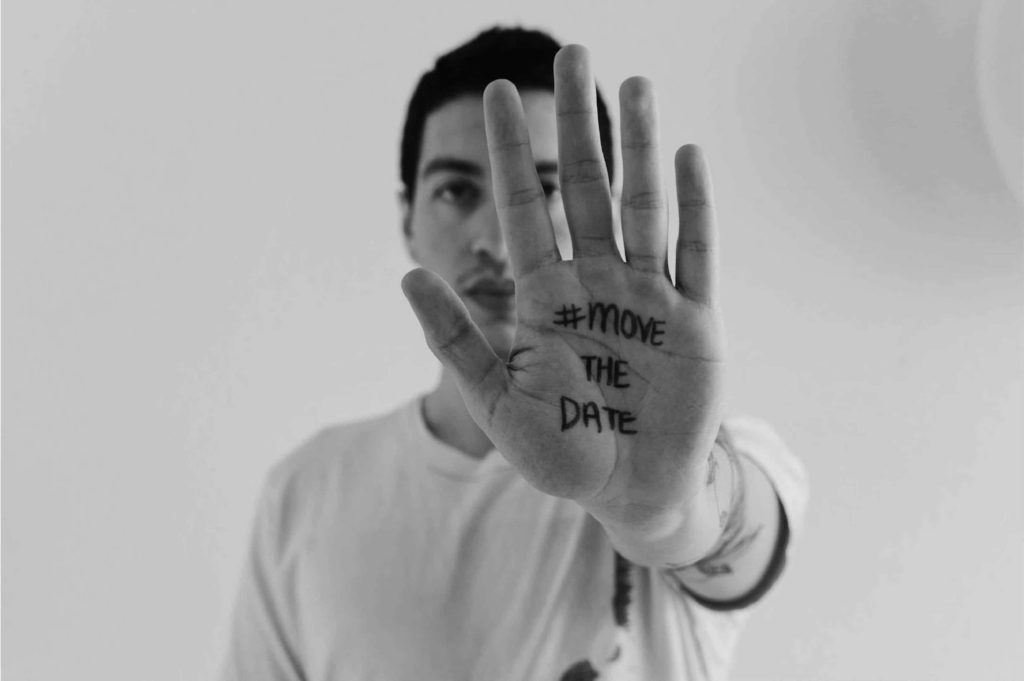
A Little Background History About This Global Overshoot
The concept of Earth Overshoot Day was initiated by Andrew Simms of the UK think tank New Economics Foundation, which partnered with Global Footprint Network in 2006 to launch the first global Earth Overshoot Day campaign.
Our planet went into global overshoot in the early 70s, more precisely, on the 29th of December of 1970. Skip forward around 50 years, in 2019, the overshoot fell on Monday, July 29th – the earliest ever recorded. Coincidence or not, the Global Overshoot of 2021 is exactly on the same date.
Having the overshoot on July 29th means that a year’s worth of resources was consumed in just 212 days. On top of that, it means that we have emitted one year’s worth of carbon dioxide in just 7 months. In 2020 things were looking a bit more optimistic: Earth Overshoot Day fell on August 22nd. Pandemic side effects? Definitely yes. But we shouldn’t rely on a worldwide catastrophe to start reducing our environmental footprint and carbon emissions.
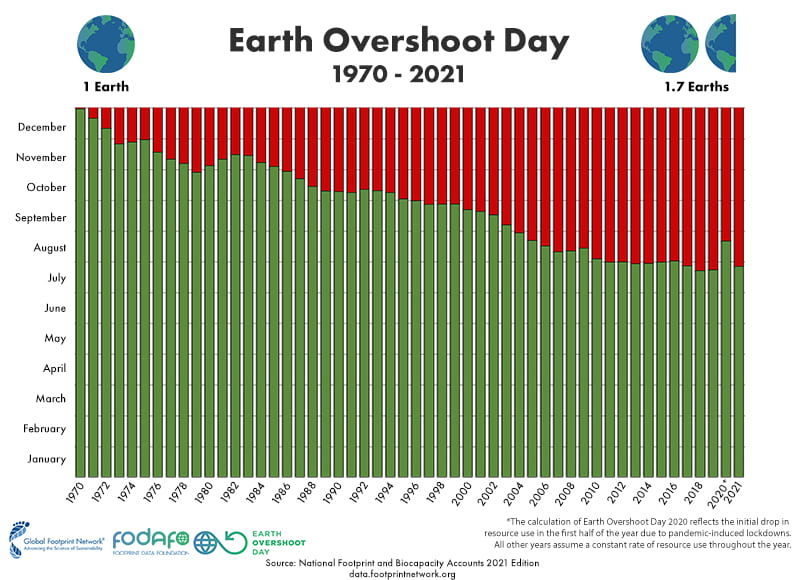
When Will Your Country Overshoot This Year?
In countries like Qatar, Luxembourg and The United States, the environmental footprint per capita is huge. In Luxembourg for example, the overshoot this year was on the 15th of February. Their car ownership rate and energy consumption per capita are both the highest in Europe: the perfect recipe for environmental degradation.
That means that in only 6 weeks since the year has started, Luxembourg spent a year’s worth of Earth’s environmental allowance. That’s why it would take more than a few earths if we were all to conduct the same lifestyles. Not only that: this is exactly why we must do our best to live more sustainably and raise awareness about this environmental emergency.
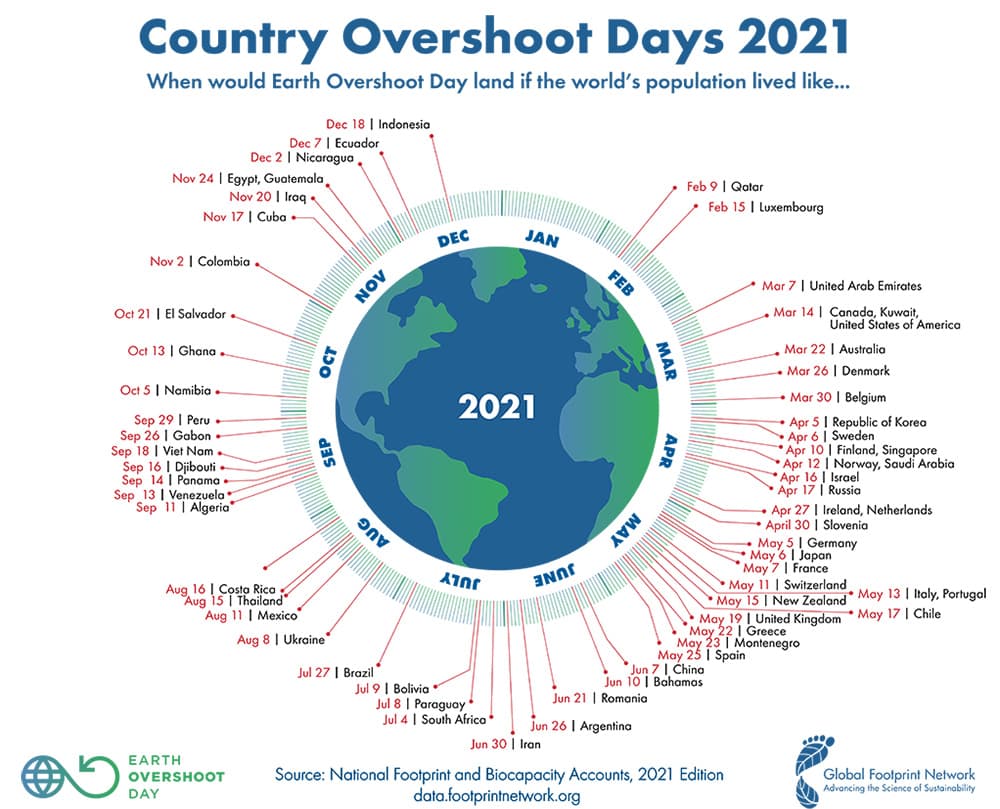
So What Can You Do About It?
All in all, it can be pretty mind-boggling to realise, on our own, that each of us personally contributes to national and global overshoot with basically everything we buy and waste.
That’s why the whole point of the overshoot campaign is to raise awareness about the fact that we collectively overspend the planet’s resources and emit way too much CO2, without sensible consideration for our ecosystems.
So, we should really try our best to adapt to more sustainable ways of living. This way, we can reduce our use of ecological resources and produce less waste over time – limiting our CO2 emissions as well.
As Mathis Wackernagel, President of Global Footprint Network put it best:
”Earth Overshoot Day is a warning about how we use our planet, but it’s also a target that is easy to understand and possible to build on.”
Let’s do our best to #MoveTheDate and put our utmost efforts towards pushing it as close as possible to the 31st of December.
Calculating Your Footprint
Now, here’s an easy and practical way to find out where you stand among our consumption and waste: Footprint Calculator! How many planets would we need if everybody lived like you? Great food for thought, and can help us better understand how much we really are contributing to the overshoot.
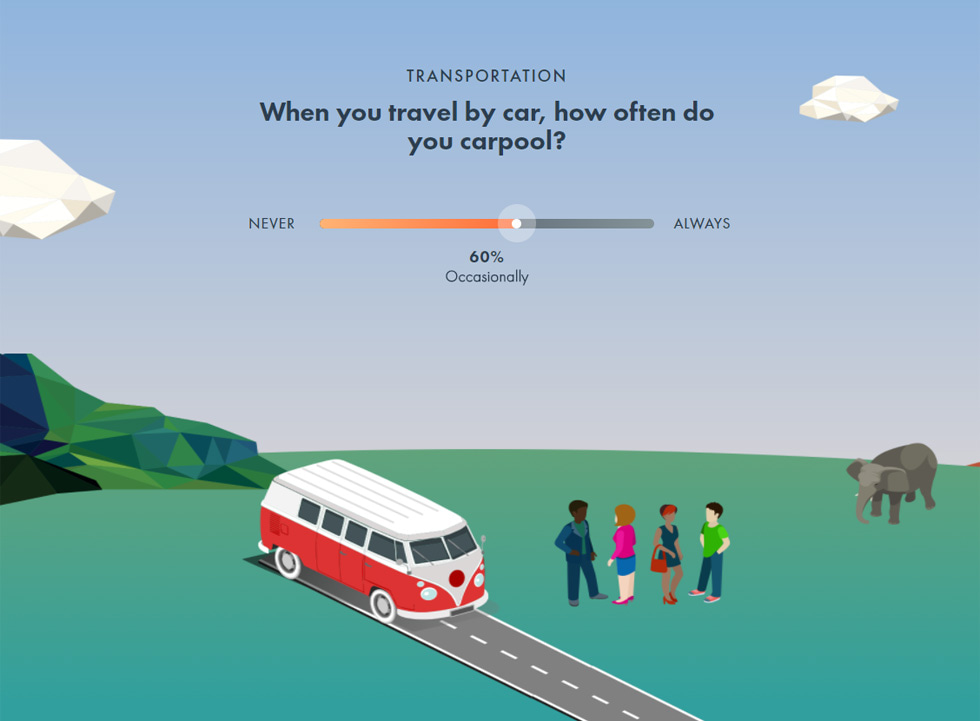
Taking Action
After you’ve gotten a better grasp on your habits, it’s time for action. Below we have listed a few ways on how we can collectively contribute to achieving a more sustainable lifestyle:
🐄 Animals: no eating, just petting
🚮 Avoid waste as much as possible
🌱 Opt for delicious plant-based foods
🔋 Switch to more sustainable energy use
♻️ Recycle, reduce, and reuse responsibly
🗓️ Support a global campaign like #MoveTheDate
🚴♂️ Bike or take public transport when it’s an option
🛍️ Don’t buy stuff you don’t need – or buy sustainable alternatives
🛢️ Reduce your use of single-use, disposable plastics: opt for reusable items
🚗 Carpool with your friends or neighbours to reduce individual carbon emissions
🗳️Vote consciously! Use your power as a citizen to support political parties and candidates that give a damn about environmental policies.
Without overlooking personal socio-economic limitations, we can probably all do better. And better doesn’t mean flawless. As the cookbook author, Anne Marie Bonneau put it very wisely about living a zero-waste lifestyle:
‘We don’t need a handful of people doing zero-waste perfectly. We need millions of people doing it imperfectly.”
Sources
1. ‘How the Date of Earth Overshoot Day 2021 Was Calculated.’ Overshoot Day. 2021
2. ‘Tons of CO2 emitted into the atmosphere.’ The World Counts. 2021

